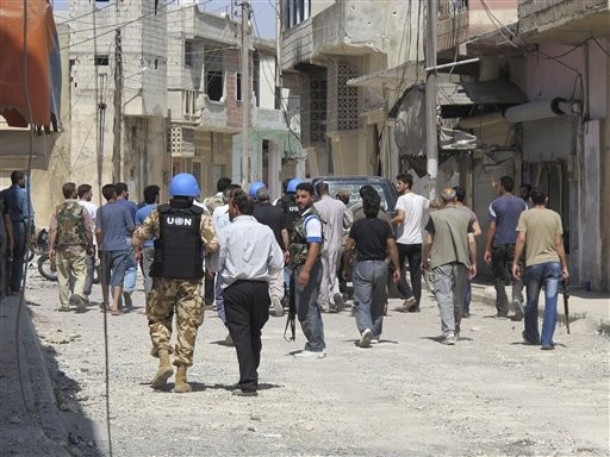Henry Kissinger recently argued against intervention in Syria [The perils of intervention in Syria,” Sunday Opinion, June 3] on the grounds that it would imperil the foundation of world order. His analysis was based on a straw man, one put forward by the Russian and Chinese governments, that outside intervention would seek to “bring about regime change.”
The point of an intervention in Syria would be to stop the killing — to force Bashar al-Assad and his government to meet the demands of the Syrian people with reforms rather than guns. If the killing stopped, it is not clear what shape the political process would adopt, how many millions would take to the streets or whom different factions would support. The majority of Syrians would almost certainly demand that Assad leave office, but by the ballot box or a negotiated political settlement that would leave the Syrian state — in the sense of bureaucracy, the army, the courts — largely intact. The chaos and horrific violence in Iraq resulted in large part from the U.S. determination to destroy those institutions along with Saddam Hussein.
As a cautionary tale, Kissinger and others point not only to Iraq but also to Libya. Kissinger lumped Libya in with Yemen, Somalia and northern Mali as a “blank space” on the map “denoting lawlessness.” Yet political scientist Juan Cole, who recently visited Libya, where he expected a fair degree of chaos, reports that in Benghazi, Misrata and Tripoli, “there were no militiamen to be seen, that most things were functioning normally, that there were police at traffic intersections, that there were children’s carnivals open till late, families out, that jewelry shops were open till 8 pm, [and] that Arabs and Africans were working side by side.” The Economist reached the same conclusion early this year, reporting on relatively optimistic economic prospects.
Kissinger is right that in the end NATO’s operations in Libya looked like an effort to remove Moammar Gaddafi from office, not because NATO planes took out command-and-control facilities in Tripoli from which Gaddafi and his generals were ordering civilian massacres but because NATO planes never sought to protect civilians supporting the regime against opposition troops. The response to this concern, however, is not to oppose intervention in Syria but to support a U.N. Security Council resolution with clear parameters about a limited use of force.
Such a resolution, which would have to follow a request by the Arab League, should resolve to protect the establishment of no-kill zones by local Syrian authorities by whatever means necessary, short of foreign troops on the ground. These means would include the provision of intelligence and communications equipment, antitank and anti-mortar weapons, and, crucially, air support against Syrian government tanks and troops that seek to enter or overrun a zone. The provision of such support would also require the disabling of Syrian air defenses.
Proposing this type of action would force the Russian and Chinese governments to come clean about the real motives for their positions. Even if Libya had never happened, would Russia really be willing to allow intervention in Syria? Assad would still be one of Moscow’s principal allies in the Middle East. Russia would still have port facilities at Tartus. It would still want to protect the principle that a government can suppress popular demonstrations by any means it chooses, including the kinds of crimes against humanity, indeed near-genocide, that Vladimir Putin ordered in Chechnya at the turn of the century.
Kissinger claimed that the Russian and Chinese governments are upholding the foundations of a world order that the United States should not lightly cast aside, an order in which sovereignty gives a government the right to rule its people and territory without intervention from other states and a corresponding obligation not to intervene in the affairs of others. It is true that this principle is enshrined in the United Nations Charter, but four years after the charter was passed U.N. members also adopted the Universal Declaration of Human Rights. By the end of the 20th century, U.N. Secretary General Kofi Annan — now the United Nations’ special envoy for Syria — was arguing that states existed to serve their people, rather than the other way around. And by 2005 all the world’s states, on the 60th anniversary of the U.N. Charter’s passage, adopted the doctrine of the responsibility to protect, which effectively adopted a definition of sovereignty as responsibility. Sovereigns bear responsibility to not only their fellow sovereigns but also their own people, to protect them from genocide, crimes against humanity, ethnic cleansing, and grave and systematic war crimes.
President Obama believes in sovereignty as responsibility. Standing up for that principle will result in a world that will be more stable, prosperous and consistent with universal values — the values Americans know as life, liberty and the pursuit of happiness. It will be a far better world for the United States as well as for Syrians, Egyptians, Tunisians, Libyans and billions of others. But bringing it into being requires demonstrating firmly and quickly that when governments cross the line of genocide, or engage in crimes against humanity, ethnic cleansing, or grave and systematic war crimes against their own people, the world will act — with force if necessary and with the approval only of a regional organization and a majority of the members of the U.N. Security Council. Only then will murderous dictators begin to think twice.
Anne-Marie Slaughter, an Atlantic Council Board member, is Dean of the Woodrow Wilson School of Public and International Affairs and the Bert G. Kerstetter ’66 University Professor of Politics and International Affairs at Princeton University. The editorial originally appeared in the Washington Post.
Image: free%20syrian%20army.jpg
